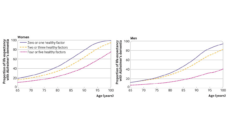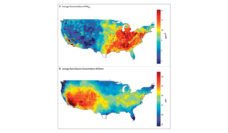Take a breath of fresh air, your brain will thank you.
For hundreds of years, we have known that polluted air is a danger to health. Although air pollution is commonly understood to damage the lungs, recent research suggests that the threat is more widespread. As pollutants move past the lungs, they can contribute to brain damage and cognitive decline.
Researchers are unclear on the exact mechanism behind air pollution’s effects on our aging brains. However, we do know that after breathing in contaminated air, particles of pollutants enter the bloodstream, causing inflammation, and as blood passes through the brain, these particles can remain behind and cause direct damage.
Nitrogen dioxide and particulate matter 2.5 (PM2.5) are particularly harmful to our brains. Both are associated with dementia and cognitive decline. Nitrogen dioxide comes from burning fuel, especially from cars and wildfires; PM2.5 is a dangerous mix of solid and liquid particles that mostly comes from vehicle emissions.
Xinhui Wang and colleagues explored whether improving air quality long-term reduces the risk of dementia in women 65 years and older. Using the Women’s Health Initiative Memory Study and Environmental Protection Agency air quality monitoring data, the researchers estimated the long-term exposure of over 2,000 women to nitrogen dioxide and PM2.5. The study’s focus on women is typical for dementia research because of women’s higher risk of dementia, though it’s not clear if this is the result of physiological differences or women’s higher life expectancy.
If improving air quality can lessen the risk of dementia, keeping up the current political momentum is important to cut emissions as the population ages.
Depending on where they lived, women experienced changes in ambient air quality over the 10 years of the study. Local changes may be due to stricter emission regulations, increasing wildfires, or the closing of a nearby power plant, for example.
Women who experienced the biggest reduction in nitrogen dioxide over 10 years saw their risk of dementia decrease by 14%. Those with the biggest reduction in PM2.5 decreased their risk by 26%. The findings suggest that improving air quality is associated with decreasing the risk of dementia in older women.
The study contributes to a growing body of evidence showing that air pollutants, specifically nitrogen dioxide and PM2.5, harm the brain. Air pollution has also been linked to other neurological diseases like Parkinson’s, autism, and stroke. A February 2023 study found that long-term exposure to air pollution is associated with a higher risk of depression in older adults.
Since the Clean Air Act of 1970, air quality in the U.S. has improved. National levels of nitrogen dioxide have dropped by 64%. PM2.5 levels, which the EPA started monitoring in 2000, have dropped by 21% in the past 20 years.
The Biden administration has pledged to further improve U.S. air quality by reducing the nation’s greenhouse gas emissions by fifty percent by 2030 and reaching zero emissions by 2050. Some programs have been announced, but much of the pledge has not yet resulted in concrete actions. If the U.S. manages to meet Biden’s latest commitments, many fewer people will be exposed to harmful pollutants.
In the 2030s, Americans 65 years and older are projected to outnumber children for the first time in U.S. history. If improving air quality can lessen the risk of dementia, keeping up the current political momentum is important to cut emissions as the population ages. Wang and team’s findings on long-term air quality improvements provide hope that we can lessen the future burden of dementia.
Photo via Getty Images














